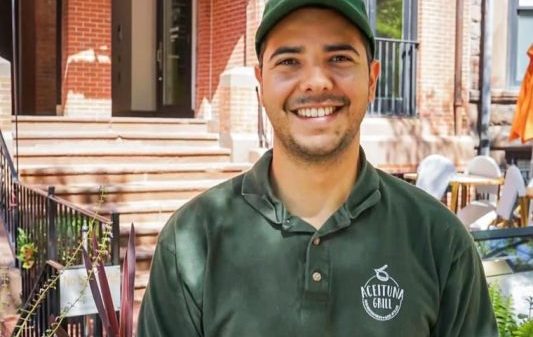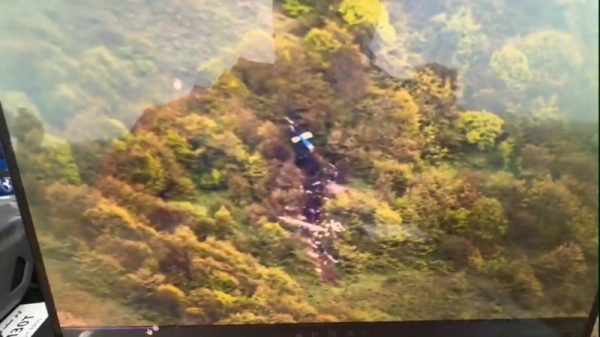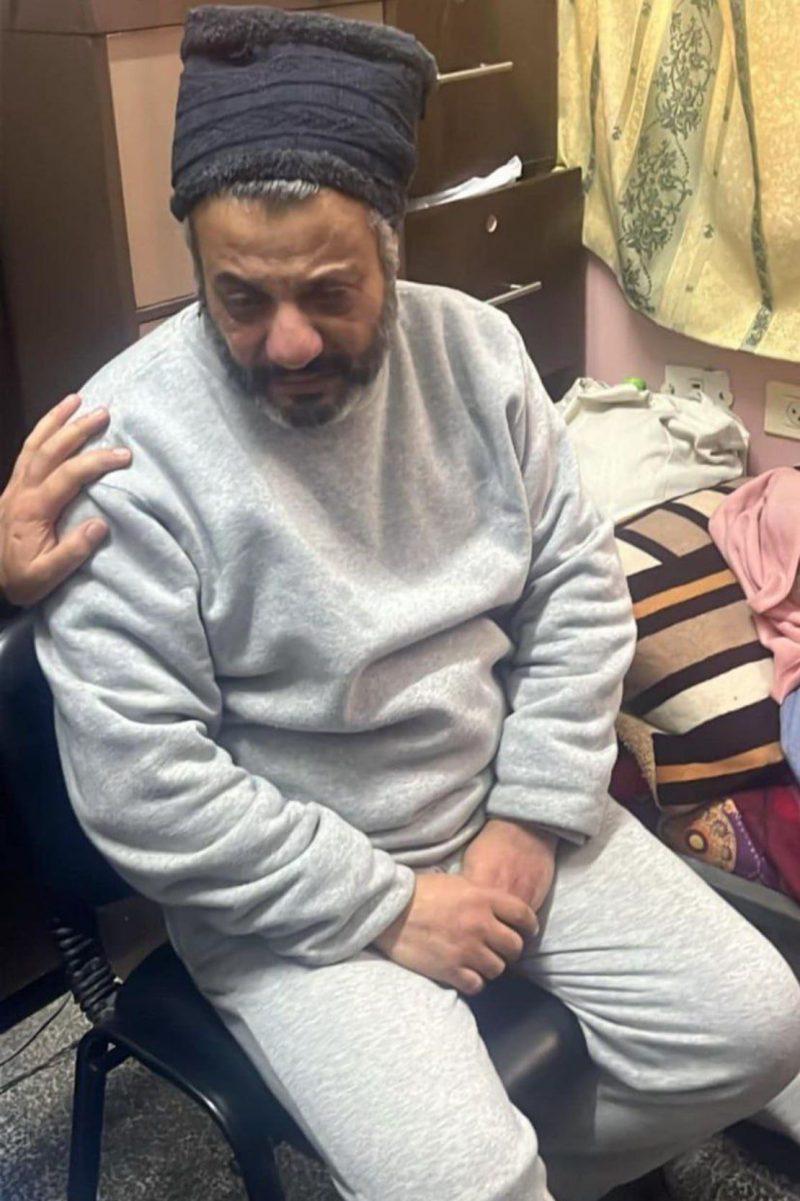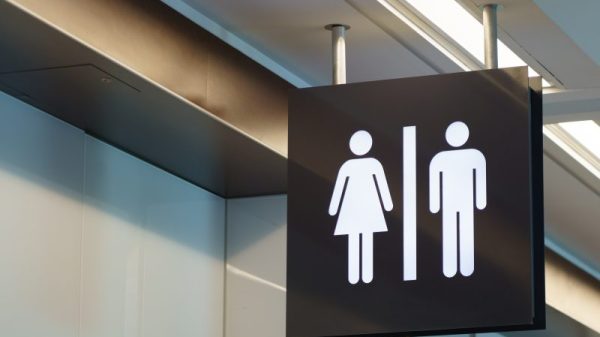At a military base that now doubles as a detention center in Israel’s Negev desert, an Israeli working at the facility snapped two photographs of a scene that he says continues to haunt him.
Rows of men in gray tracksuits are seen sitting on paper-thin mattresses, ringfenced by barbed wire. All appear blindfolded, their heads hanging heavy under the glare of floodlights.
“We were told they were not allowed to move. They should sit upright. They’re not allowed to talk. Not allowed to peek under their blindfold.”
Guards were instructed “to scream uskot” – shut up in Arabic – and told to “pick people out that were problematic and punish them,” the source added.
They paint a picture of a facility where doctors sometimes amputated prisoners’ limbs due to injuries sustained from constant handcuffing; of medical procedures sometimes performed by underqualified medics earning it a reputation for being “a paradise for interns”; and where the air is filled with the smell of neglected wounds left to rot.
We were told they were not allowed to move. They should sit upright. They’re not allowed to talk. Not allowed to peek under their blindfold.
An Israeli whistleblower recounting his experience at Sde Teiman
According to the accounts, the facility some 18 miles from the Gaza frontier is split into two parts: enclosures where around 70 Palestinian detainees from Gaza are placed under extreme physical restraint, and a field hospital where wounded detainees are strapped to their beds, wearing diapers and fed through straws.
“They stripped them down of anything that resembles human beings,” said one whistleblower, who worked as a medic at the facility’s field hospital.
“(The beatings) were not done to gather intelligence. They were done out of revenge,” said another whistleblower. “It was punishment for what they (the Palestinians) did on October 7 and punishment for behavior in the camp.”
“Detainees are handcuffed based on their risk level and health status. Incidents of unlawful handcuffing are not known to the authorities.”
The IDF did not directly deny accounts of people being stripped of their clothing or held in diapers. Instead, the Israeli military said that the detainees are given back their clothing once the IDF has determined that they pose no security risk.
Reports of abuse at Sde Teiman have already surfaced in Israeli and Arab media after an outcry from Israeli and Palestinian rights groups over conditions there. But this rare testimony from Israelis working at the facility sheds further light on Israel’s conduct as it wages war in Gaza, with fresh allegations of mistreatment. It also casts more doubt on the Israeli government’s repeated assertions that it acts in accordance with accepted international practices and law.
Detained in the desert
The Israeli military has acknowledged partially converting three different military facilities into detention camps for Palestinian detainees from Gaza since the Hamas-led October 7 attack on Israel, in which Israeli authorities say about 1,200 were killed and over 250 were abducted, and the subsequent Israeli offensive in Gaza, killing nearly 35,000 people according to the strip’s health ministry. These facilities are Sde Teiman in the Negev desert, as well as Anatot and Ofer military bases in the occupied West Bank.
The camps are part of the infrastructure of Israel’s Unlawful Combatants Law, an amended legislation passed by the Knesset last December that expanded the military’s authority to detain suspected militants.
The law permits the military to detain people for 45 days without an arrest warrant, after which they must be transferred to Israel’s formal prison system (IPS), where over 9,000 Palestinians are being held in conditions that rights groups say have drastically deteriorated since October 7. Two Palestinian prisoners associations said last week that 18 Palestinians – including leading Gaza surgeon Dr. Adnan al-Bursh – had died in Israeli custody over the course of the war.
The military detention camps – where the number of inmates is unknown – serve as a filtration point during the arrest period mandated by the Unlawful Combatants Law. After their detention in the camps, those with suspected Hamas links are transferred to the IPS, while those whose militant ties have been ruled out are released back to Gaza.
Al-Ran, a Palestinian who holds Bosnian citizenship, headed the surgical unit at northern Gaza’s Indonesian hospital, one of the first to be shut down and raided as Israel carried out its aerial, ground and naval offensive.
He was arrested on December 18, he said, outside Gaza City’s Al-Ahli Baptist Hospital, where he had been working for three days after fleeing his hospital in the heavily bombarded north.
He was stripped down to his underwear, blindfolded and his wrists tied, then dumped in the back of a truck where, he said, the near-naked detainees were piled on top of one another as they were shuttled to a detention camp in the middle of the desert.
“We cried and cried and cried. We cried for ourselves, cried for our nation, cried for our community, cried for our loved ones. We cried about everything that crossed our minds.”
From Social Media
From Social Media
A week into his imprisonment, the detention camp’s authorities ordered him to act as an intermediary between the guards and the prisoners, a role known as Shawish, “supervisor,” in vernacular Arabic.
According to the Israeli whistleblowers, a Shawish is normally a prisoner who has been cleared of suspected links to Hamas after interrogation.
The Israeli military denied holding detainees unnecessarily, or using them for translation purposes. “If there is no reason for continued detention, the detainees are released back to Gaza,” they said in a statement.
Our days were filled with prayer, tears, and supplication. This eased our agony.
Former detainee Dr. Mohammed al-Ran
However, whistleblower and detainee accounts – particularly pertaining to Shawish – cast doubt on the IDF’s depiction of its clearing process. Al-Ran says that he served as Shawish for several weeks after he was cleared of Hamas links. Whistleblowers also said that the absolved Shawish served as intermediaries for some time.
They are typically proficient in Hebrew, according to the eyewitnesses, enabling them to communicate the guards’ orders to the rest of the prisoners in Arabic.
For that, al-Ran said he was given a special privilege: his blindfold was removed. He said this was another kind of hell.
“Part of my torture was being able to see how people were being tortured,” he said. “At first you couldn’t see. You couldn’t see the torture, the vengeance, the oppression.
“When they removed my blindfold, I could see the extent of the humiliation and abasement … I could see the extent to which they saw us not as human beings but as animals.”
For those who repeatedly breached the prohibition on speaking and moving, the punishment became more severe. Israeli guards would sometimes take a prisoner to an area outside the enclosure and beat him aggressively, according to two whistleblowers and al-Ran. A whistleblower who worked as a guard said he saw a man emerge from a beating with his teeth, and some bones, apparently broken.
When they removed my blindfold, I could see the extent of the humiliation and abasement … I could see the extent to which they saw us not as human beings but as animals.
Former detainee Dr. Mohammed Al-Ran
That whistleblower and al-Ran also described a routine search when the guards would unleash large dogs on sleeping detainees, lobbing a sound grenade at the enclosure as troops barged in. Al-Ran called this “the nightly torture.”
“While we were cabled, they unleashed the dogs that would move between us, and trample over us,” said al-Ran. “You’d be lying on your belly, your face pressed against the ground. You can’t move, and they’re moving above you.”
The same whistleblower recounted the search in the same harrowing detail. “It was a special unit of the military police that did the so-called search,” said the source. “But really it was an excuse to hit them. It was a terrifying situation.”
“There was a lot of screaming and dogs barking.”
Strapped to beds in a field hospital
Whistleblower accounts portrayed a different kind of horror at the Sde Teiman field hospital.
“What I felt when I was dealing with those patients is an idea of total vulnerability,” said one medic who worked at Sde Teiman.
“If you imagine yourself being unable to move, being unable to see what’s going on, and being completely naked, that leaves you completely exposed,” the source said. “I think that’s something that borders on, if not crosses to, psychological torture.”
Another whistleblower said he was ordered to perform medical procedures on the Palestinian detainees for which he was not qualified.
“I was asked to learn how to do things on the patients, performing minor medical procedures that are totally outside my expertise,” he said, adding that this was frequently done without anesthesia.
“If they complained about pain, they would be given paracetamol,” he said, using another name for acetaminophen.
“Just being there felt like being complicit in abuse.”
The same whistleblower also said he witnessed an amputation performed on a man who had sustained injuries caused by the constant zip-tying of his wrists. The account tallied with details of a letter authored by a doctor working at Sde Teiman published by Ha’aretz in April.
“From the first days of the medical facility’s operation until today, I have faced serious ethical dilemmas,” said the letter addressed to Israel’s attorney general, and its health and defense ministries, according to Ha’aretz. “More than that, I am writing (this letter) to warn you that the facilities’ operations do not comply with a single section among those dealing with health in the Incarceration of Unlawful Combatants Law.”
The spokesperson added that the handcuffing of the detainees was done in “accordance with procedures, their health condition and the level of danger posed by them,” and that any allegation of violence would be examined.
They stripped them down of anything that resembles human beings.
An Israeli whistleblower recalling his experience at Sde Teiman
Whistleblowers also said that medical team were told to refrain from signing medical documents, corroborating previous reporting by rights group Physicians for Human Rights in Israel (PHRI).
The PHRI report released in April warned of “a serious concern that anonymity is employed to prevent the possibility of investigations or complaints regarding breaches of medical ethics and professionalism.”
“You don’t sign anything, and there is no verification of authority,” said the same whistleblower who said he lacked the appropriate training for the treatment he was asked to administer. “It is a paradise for interns because it’s like you do whatever you want.”
Concealed from the outside world
Sde Teiman and other military detention camps have been shrouded in secrecy since their inception. Israel has repeatedly refused requests to disclose the number of detainees held at the facilities, or to reveal the whereabouts of Gazan prisoners.
Last Wednesday, the Israeli Supreme Court held a hearing in response to a petition brought forward by Israeli rights group, HaMoked, to reveal the location of a Palestinian X-Ray technician detained from Nasser Hospital in southern Gaza in February. It was the first court session of its kind since October 7.
Israel’s highest court had previously rejected writs of habeas corpus filed on behalf of dozens of Palestinians from Gaza held in unknown locations.
The disappearances “allows for the atrocities that we’ve been hearing about to happen,” said Tal Steiner, an Israeli human rights lawyer and executive director of the Public Committee Against Torture in Israel.
Satellite images provide further insight into activities at Sde Teiman, revealing that in the months since the start of the Israel-Hamas war on October 7, more than 100 new structures, including large tents and hangars, have been built at the desert camp. A comparison of aerial photographs from September 10, 2023 and March 1 this year also showed a significant increase in the number of vehicles at the facility, indicating an uptick in activity. Satellite imagery from two dates in early December showed construction work in progress.
“I was there for 23 days. Twenty-three days that felt like 100 years,” said 27-year-old Ibrahim Yassine on the day of his release from a military detention camp.
He was lying in a crowded room with over a dozen newly freed men – they were still in the grey tracksuit prison uniforms. Some had deep flesh wounds from where the handcuffs had been removed.
“We were handcuffed and blindfolded,” said another man, 43-year-old Sufyan Abu Salah. “Today is the first day I can see.”
Several had a glassy look in their eyes and were seemingly emaciated. One elderly man breathed through an oxygen machine as he lay on a stretcher. Outside the hospital, two freed men from the Palestinian Red Crescent Society and embraced their colleagues.
For Dr. Al-Ran, his reunion with his friends was anything but joyful. The experience, he said, rendered him mute for a month as he battled an “emotional deadness.”
“It was very painful. When I was released, people expected me to miss them, to embrace them. But there was a gap,” said al-Ran. “The people who were with me at the detention facility became my family. Those friendships were the only things that belonged to us.”
Just before his release, a fellow prisoner had called out to him, his voice barely rising above a whisper, al-Ran said. He asked the doctor to find his wife and kids in Gaza. “He asked me to tell them that it is better for them to be martyrs,” said al-Ran. “It is better for them to die than to be captured and held here.”
Credits
Executive producer: Barbara Arvanitidis
Senior investigations writer: Tamara Qiblawi
Chief global affairs correspondent: Matthew Chance
OSINT reporter: Allegra Goodwin
Photojournalist: Alex Platt
Reporters: Abeer Salman, Ami Kaufman, Kareem Khadder, Mohammad Al Sawalhi and Tareq Al Hilou
Visual and graphic editors: Carlotta Dotto, Lou Robinson and Mark Oliver
3D designer: Tom James
Photo editor: Sarah Tilotta
Video editors: Mark Baron, Julie Zink and Augusta Anthony
Motion designers: Patrick Gallagher and Yukari Schrickel
Digital editors: Laura Smith-Spark and Eliza Mackintosh
Executive editors: Dan Wright and Matt Wells
Editor’s note: Tamara Qiblawi wrote and reported from London. Matthew Chance, Barbara Arvanitidis and Alex Platt reported from Sde Teiman; Ami Kaufman and Allegra Goodwin reported from London; Abeer Salman and Kareem Khadder reported from Jerusalem; and journalists Mohammad Al Sawalhi and Tareq Al Hilou reported from Gaza.







































